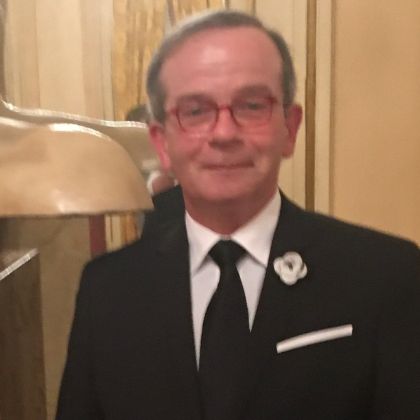It begins by chance: an army pensioner dies in his sleep owing rent. The enterprising landlord decides to sell the body to one of the thriving anatomy schools in Edinburgh’s Surgeons Square and recoups nearly double the rent owed. Impressed with the freshness of the cadaver, the doctor expresses interest in purchasing specimens of similar quality. With the help of a friend, he goes into business, monetizing murder and averaging £10 (roughly £870 today) for each of their sixteen known victims – the majority women living at the margins of society – before being caught.
Despite its title, the victims dominate Julian Grant and Mark Campbell’s caustic one-act opera. Even before the music starts, they silently take possession of the set, their white and light grey costumes caked with lime, faces chalky, eyes sunken, haunting the scene of their final humiliation, an antiseptic, bright, white dissection theater. Scalpel never touches flesh, though; it’s society on the table waiting to be dissected and by those it considered worthless alive but valuable merchandise once dead. Beginning with David Cushing’s solemn, doleful pensioner, they come forward, write their name on the doctors’ blackboard (which also functions as a screen for projected period engravings) and tell their tale in a combination of monologue and re-enactment. The action freezes with a brief blackout before each murder occurs and skips to the aftermath, unfolding in a ghostly half light. Only Madge Docherty, the final victim, is suffocated onstage by Burke with Hare sitting on her chest and restraining her flailing arms
Grant’s score is propelled by repetition, stark harmonies, and sharp shards of rhythm. Moments of melodic lyricism, usually assigned to a character’s signature instrument, become all the more arresting within the lean soundscape David Angus and the orchestra of twelve creates, most affectingly with Daft Jamie’s viola and Madge’s cello.
Rigid class distinctions of the period blur, with the murderers and the doctors two sides of the same coin. A feckless opportunist (Hare and Knox) dominates and manipulates a conflicted but easily compromised subordinate (Burke and Ferguson). As a contemporary doggerel succinctly expressed the level of complicity: “Burke’s the butcher, Hare’s the thief/Knox the boy that buys the beef.” Flying high in the tenor range, William Burden’s arrogant Dr Knox delivers an opening apostrophe to Knowledge which combines an idolatrous devotion to its pursuit with the honeyed tones of a huckster. All expedients are allowed in seeking such a greater good. Burden’s tenor gleams like a well honed scalpel as it carves out excuses and justifications; wheedles and intimidates.
Craig Colclough, as his counterpart Hare, is both a cuddly teddy bear with a toothy grin and a winning manner and a driven sociopath. His warm bass-baritone nearly makes his justification for murder sound reasonable: hastening the inevitable by “putting one foot where the other already is – in the grave”. Burke and Ferguson protest and dissent but ultimately lack the will to follow their conscience. Jesse Blumberg and David McFerrin embody that struggle with Blumberg creating sympathy for Burke and McFerrin touching when he lifts a shroud to discover Mary, with whom he had earlier shared an amorous moment. Michelle Trainor and Heather Gallagher as the murderers’ wives are enthusiastic co-conspirators, two gleeful ghouls who egg their men on.
Ironies abound in Campbell’s libretto, but Daft Jamie’s role as the opera’s wise fool is the most poignant. A hobbled simpleton, he stands at the moral center of the drama. Michael Slattery’s sweet, light tenor turned fierce and chilling for “Turn A Blind Eye”, his plea for those forgotten and deemed superfluous delivered post mortem from atop the dissection table. Mary Paterson’s youth and vitality elicit even more sympathy. Unlike the two other female victims poignantly brought to life by Marie McLaughlin and Antonia Tamer, both her feet are firmly on this side of the grave and she has reasonable hope for a better life. Her narrative unfolds to the lilt of a hollowed out ballad which Emma Sorensen sang with intense focus and unapologetic defiance.
Though the audience becomes part of the amphitheater seated on stepped, black platforms with rows of folding chairs painted the same white as the set, David Schweitzer’s staging with its Brechtian touches emulates the cool palette of the scenery and score creating a sense of distance between the observer and the observed which the acting sometimes bridges.
At the end, Hare turns state’s evidence. He and the women go free. Burke is condemned to hang and ends up marked and numbered for dissection, a fate he accepts as just. To this day, his skeleton, death mask, and a calling card case fashioned from his tanned skin remain on display in Edinburgh.


